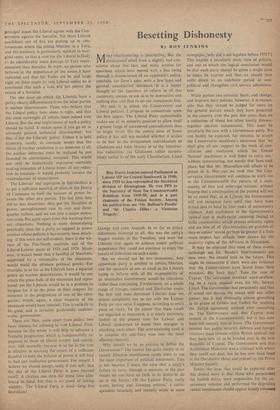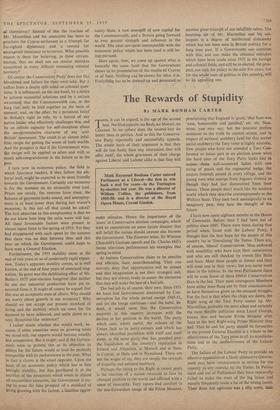Besetting Dishonesty
By ROY JENKINS
MosT -electioneering is destrtictive.: But the participants' often' have a slightly bad con- science about this fact, and many articles (or speeches), which have moved with a fine swing through a denunciation of an opponent's policy, conclude, for form's sake, with a few lame and garbled 'constructive' 'sentences.' It is 'ii happy thought of the Spectator to relieve us of this customary unease, to ask us to be destructive and ,nothing else, and thus to set our consciences free.
My .task is to attack the Conservative and Liberal policies. I propose to concentrate upon the first. aspect. The Liberal Party undoubtedly makes use of its minority position to allow itself a greater range of unresolved. contradictionsthan its larger rivals. On the central issue of home policy it has still not decided Whether it wishes to be heir to the unrepentant individualism of Gladstone and John Morley or to the 'construc- tive radicalism' (as Gladstone rather incredu- lously 'called it) of the early Chamberlain, Lloyd
Roy Harris Jenkins entered Parliament as Labour MP for Central Southwark in 1948; since 1950 heJuis represented the Stechford division of Birmingham. He was PPS to the Secretary of State for Commonwealth Relations from 1949-50, and is a past chairman of the Fabian Society. Among his publications are 'Mr. Balfour's Poodle' and 'Sir Charles Dilke : a Victorian Tragedy.'
George and even Asquith. In so far as policy differences Mattered at all, this was the party's biggest trouble in the Twenties; and were the Liberals ever again to achieve major political importance they could not continue to enjoy the luxury of indecision on such a scale.
But we should not be too censorious: Any opposition party is entitled to certain 'liberties, and the spectacle of one as small-as the Liberals trying to behave with all the responsibility of an alternative Government would ,t)e ridiculous rather than convincing. Furthermore, on a „whole range of foreign, colonial and libertarian issues the best and most dominant Liberals now see.. almost completely eye to eye with the Labour. Party (or vice versa, I suppose, according to one's point of view). To the extent that these issues. are regarded as important, it is surely extremely foolish at the present time for Labour and Liberal spokesmen to waste their energies in attacking each other. The overwhelming need is to canalise the anti-Tory vote into the most effective channels.
Why should we be so anxious to defeat the Government? The answer lies quite simply in its record. Election manifestoes rarely seem to me the most important of political documents. This is not because I share the view that a party's failure to carry through a measure in the past means we can have no faith in its desire to do so in the future. ('If the Labour Party really wants betting and licensing reform,' a corre- spondent fatuously and recently wrote in some newspaper„'why did it riot legislate before 1951?') This implies a peculiarly static view of politics, and one to which the logical conclusion would be that each party should be given a single term to make its imprint and that we should then settle down to an indefinite period of non- political and changeless civil service administra- tion.
While parties can certainly learn, and change, and improve their policies, however, it is reason- able that they should be judged far more on the general picture which they have presented to the country over the past few years than on a collection of bland but often hastily thrown- together election inducements. This must be peculiarly the case with a Government party. We can hardly be expected, for instance, to accept the Conservative manifesto's statement that 'we shall give all our support to the work of con- ciliation and mediation which the United Nations' machinery is well fitted to carry out,' without remembering, not merely that Suez took place, but that Mr. Macmillan still affects to be proud of it. Nor ,can we read that 'the Con- servative Government will continue to work out in the Commonwealth the pattern of a com- munity of free and sovereign nations' without hoping that a continuation of the pattern will not be so exact that, as in Cyprus, the Government will not recognise facts until they have been driven into its head by four years of unnecessary violence. And confidence in the Government's 'central aim in multi-racial countries [being] to build communities which protect minority rights and are free, of all discrimination on grounds of race or colour' would perhaps be greater if a little , more respect had already been shown for the majority rights of the Africans in Nyasaland.
It -may be objected that most of these events (although not Dr. Banda's imprisonment) are now over. We should look to the future. This might be reasonable if there were any evidence that the Conservatives have learnt from their mistakes." But) 'have they? Take the case of Cyprus. The., settlement involved word-swallow- ing on .a scale, unusual even for Mr. Selwyn Lloyd. The Government had persistently said that if would not discuss the island with any other power; but it was eventually almost grovelling in its praise of Greece and Turkey for reaching the Zurich agreement without even consulting us. The' 'Government said that Cyprus must remain in the Commonwealth, but it has now been left entirely free to leave. The Government insisted that public security, defence and foreign relations must remain within British control; but they have now all to be handed over to the new Republic of Cyprus. The Government said that Archbishop Makarios was a criminal with whom they could not deal; but he has now been feted at the Dorchester Hotel and praised by the Prime Minister himself.
Surely the least that could be expected after this dismal story is that those who perpetrated the foolish delay, were responsible for the un- necessary violence and performed the degrading verbal somersaults should appear faintly ashamed
of themselves? Instead of this the reaction of Mr. Macmillan and his associates has been to proclaim the Cyprus settlement as a triumph for far-sighted diplomacy and a reward for courageous resistance to terrorism. What possible reason is there for believing, in these circum- stances, that we shall not see similar mistakes committed in every difficult remaining colonial territory?
Of course the Conservative Party does not like bloodshed and failure for their own-sake, But it suffers from a deeply split mind on colonial ques- tions. It is influenced, on the one hand, by a desire to achieve successful solutions and by a certain awareness that the Commonwealth can, in the long run, only be held together on the basis of consent; and, on the other, by a persistent belief in Britain's right to rule, by a hatred of any native leader who effectively challenges this, and by an infinite capacity for self-deception about the unrepresentative character of any 'anti- British' movement. The result is an almost infal- lible recipe for getting the worst of both worlds. And the prospect is that if the Government wins, the recipe will be applied as often and with as much self-congratulation in the future as in the past.
1 turn now to economic policy, the field in which Spectator readers, if they follow the edi- torial lead, might be expected to be most friendly towards the Government. Certainly our economy is for the moment on an unusually even keel. Prices are steady, the reserves have risen, the balance of payments looks sound, and unemploy- ment is at least lower than during last winter's recession. Is this not all that could be asked? The first objection to this complacency is that we do not know how long the calm water will last. All these favourable factors were present in almost equal force in the spring of 1955. Yet they had disappeared with such speed by the autumn that there was no date between then and this year on which the Government could hope to have won a General Election.
Furthermore, the 1955 stability came at the end of two years or so of moderately rapid expan- sion. Today's apparent stability comes, as is well known, at the end of four years of sustained stag- nation. So great was the debilitating effect of Mr. Butler's 1955 post-election hangover that neither he nor our industrial production have yet re- covered from it. It might of course be argued that this was an acceptable state of affairs. Why should we worry about growth in our economy? Why should we not accept our present standard of living and the stability which we seem for the moment to have achieved, and settle down to a cosy Byzantine-like existence?
I rather doubt whether this would work, be- cause, if other countries went on growing while We stood still, our exports would become steadily less competitive. But it might; and if the Govern- ment were to present this as its objective its claims for the future would at least be perfectly compatible with its performance in the past. What in fact it claims is the exact opposite. Upon the basis of an economic policy which has at best brought stability, but has purchased it at the sacrifice of the dynamism which exists in almost all competitive countries, the Government is try- ing to erect the fake prospect of a standard of living growing with the fastest, a limitless oppor-
tunity State, a vast overspill of new capital for the Commonwealth, and a Britain going forward to ever greater strength and influence in the world. The aims are.quite incompatible with the economic policy which has been (and is still be- ing) pursued.
Here again, then, we come up against what is basically the same fault that the Government shows in its presentation of the results of Cyprus or of Suez. Nothing can beshown for what it is.
• Eveiything has to be dressed up and Presented as! another great triumph of our infallible rulers. The besetting sin of Mr. Macmillan and his col- leagues is a degree of intellectual dishonesty which has not been seen in British politics for a long time past. If a Government can continue with this, and can make the criminal mistakes which have been made since 1955 in the foreign and colonial fields, and still be re-elected, the pros- pect, not only for policy in the next five years, but for the whole tone of politics in this country, will be an appalling one.



































 Previous page
Previous page